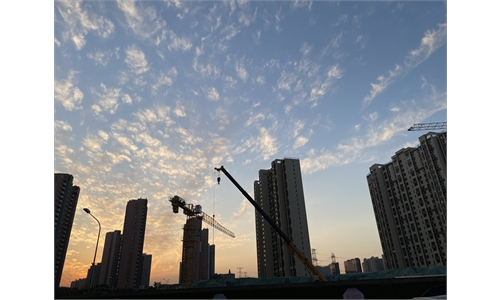
real estate Photo:Xinhua
China's first-half property investment fell 7.9 percent year-on-year to 5.86 trillion yuan ($819.7 billion), according to data released by the National Bureau of Statistics (NBS) on Monday."The real estate sector showed a stabilizing trend in the first half, with major indexes including housing sales and property investment posting improvement compared with 2022," Fu Linghui, an NBS spokesperson, told the media.
Property investment will remain relatively low but it will gradually return to a reasonable level along with market adjustments, Fu said. He noted that China's property sector is shifting from high-speed growth to steady development over the medium and longer term.
"Along with the economic recovery and policies that promote the sector's healthy development, the property market will stabilize," he said.
Property investment declined 10 percent year-on-year in 2022, while residential property investment alone fell 9.5 percent, according to the NBS.
Yan Yuejin, research director at Shanghai-based E-house China R&D Institute, expressed full confidence in the sector's development in the second half and in the years to come, noting that the sector is expected to continue to stabilize as the economy improves and policies to promote the industry's sound development take effect.
Fu said that housing speculation has been gradually curbed while inelastic demand for buying homes and upgrading has been released in a controlled way, which will contribute to the sustained development of the sector.
On the supply side, certain developers are highly leveraged with complicated financing methods. This situation can't be sustained and China's property supply experiences periodic adjustments.
Given the driving effect of the housing sector, the authorities will roll out more support policies in the second half to stabilize housing transactions and ensure the sector's healthy fundamentals, Yan said.
By sticking with the principle of "houses are for living in, not for speculating," the authorities will move faster to put in place a housing system that ensures supply through multiple sources, provides support through multiple channels, and encourages both purchases and rentals, Fu said.
He noted efforts in implementing a long-term mechanism that promotes the stable and sound development of the housing market.
Policymakers have rolled out measures such as encouraging commercial banks to grant loans for real estate projects and allowing cities to adjust the lower limit for first-home mortgage rates.
On June 20, China cut the market-based benchmark lending rate, which is expected to effectively drive down real loan interest rates, reduce financing costs, stimulate credit demand, and strengthen the growth momentum of consumption and investment. The over-five-year loan prime rate, on which many lenders base their mortgage rates, was cut by 10 basis points to 4.2 percent.



